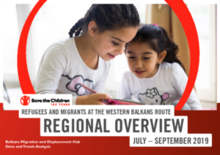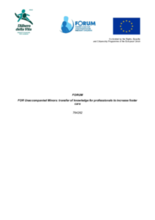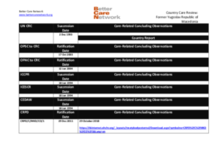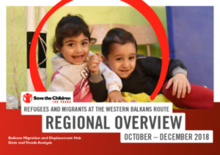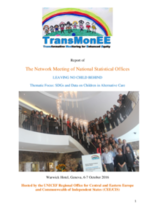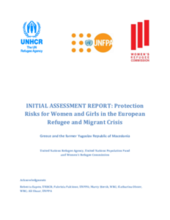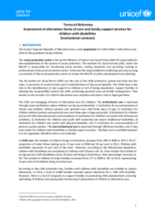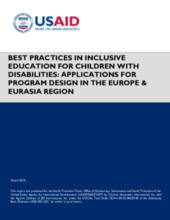Displaying 11 - 20 of 21
Data and Trend Analysis (DATA) Refugees and Migrants at the Western Balkans Route Regional Overview, covering period July - September 2019, describes key trends in migrations in the region, detailing information about the number of people on the move, demography (age, sex, country of origin, etc), behavioral patterns, and routes in use - with a focus on children, particularly unaccompanied children.
This article is written as part of the FORUM project (FOR Unaccompanied Minors: transfer of knowledge for professionals to increase foster care), an EU funded project which sought to enhance the capacity of professionals to provide quality foster care for unaccompanied migrant children, primarily through the transfer of knowledge. The article aims to contribute to this transfer of knowledge by bringing together literature which is of relevance to professionals developing or enhancing foster care services for unaccompanied migrant children.
UNICEF is seeking an international consultant to provide technical support to the Ministry of Labour and Social Policy in strengthening of the foster care system in the country.
This country care review includes the care-related Concluding Observations adopted by the Committee on the Rights of Persons with Disabilities.
Data and Trend Analysis (DATA) Refugees and Migrants at the Western Balkans Route Regional Overview, covering period October - December 2018, describes key trends in migrations in the region, detailing information about the number of people on the move, demography (age, sex, country of origin, etc), behavioral patterns, and routes in use - with a focus on children, particularly unaccompanied children. Data in this report includes key trends in Bulgaria, North Macedonia, Serbia, Albania, Montenegro, Bosnia and Herzegovina, and Croatia.
This document summarizes the content of the 6-7 October 2016 Network Meeting of National Statistical Offices. The event comprised of a number of presentations on topics related to the SDGs and data on children in alternative care.
The UN Refugee Agency and UNICEF are setting up 20 centers to support and protect children and families fleeing war and persecution as they move across Europe’s well-worn migration routes. The centers, known as Blue Dot Hubs, are intended to provide a safe place for children and families facing risks once they arrive in Greece and move along the Balkan migratory route, which includes the former republic of Macedonia, Serbia, Croatia and Slovenia. In these hubs, children can play and their families can receive services and counseling.
Concerned by the protection risks faced by women and girls, the United Nations Refugee Agency (UNHCR), the United Nations Population Fund (UNFPA) and the Women’s Refugee Commission (WRC) undertook a joint seven-day assessment mission to Greece and the former Yugoslav Republic of Macedonia in November 2015. This report describes the assessment’s findings and key recommendations for the European Union (EU), transit and destination country governments, humanitarian actors and civil society organizations (CSOs).
UNICEF is calling for the submission of proposals to conduct an assessment of alternative forms of care and family support services for children with disabilities in the Former Yugoslav Republic of Macedonia.
The purpose of this study is to provide an overview of best practices in inclusive education, inform stakeholders of the current status of inclusive education in the region, describe the contextual factors which affect program implementation, and make recommendations of practical start-up steps for inclusive education programs.

